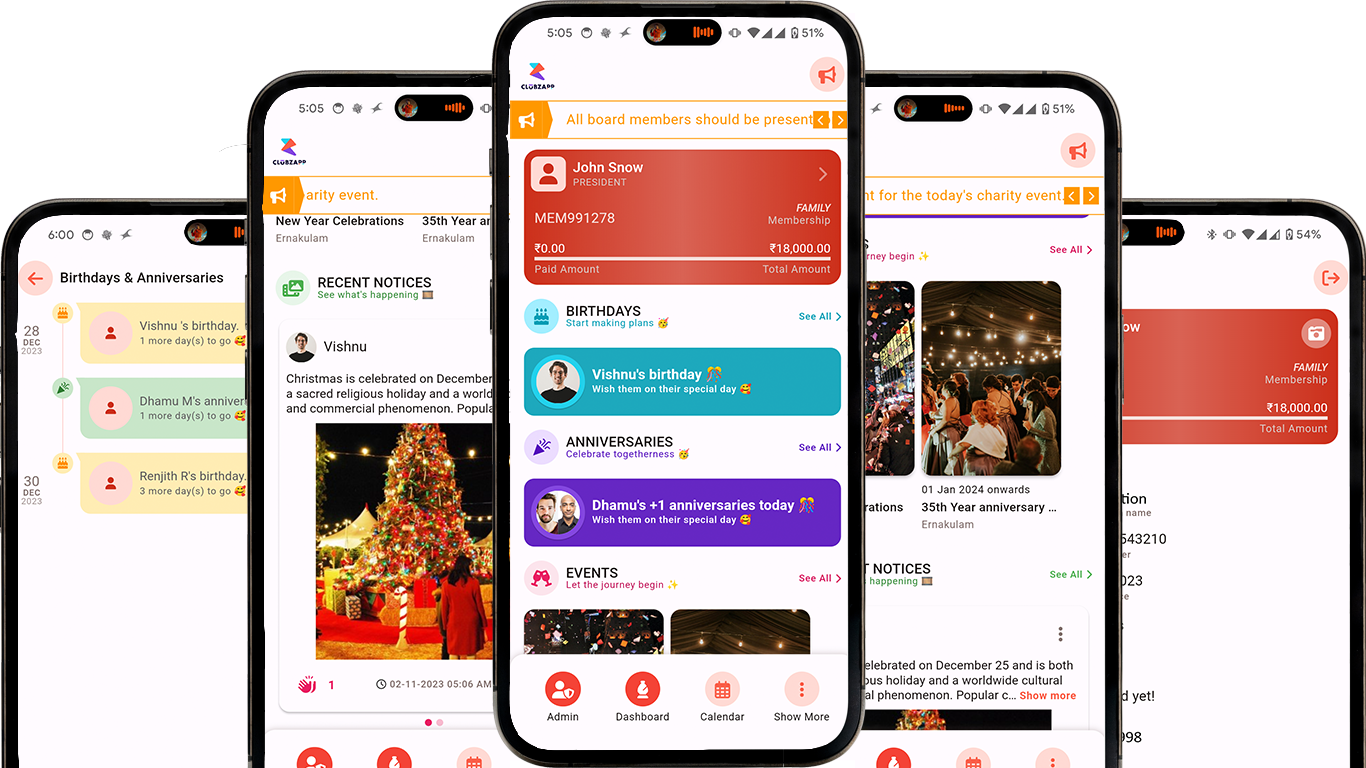Association Management Software
Association Management Software (AMS) streamlines operations, manages members, events, and finances for associations, optimizing efficiency.
Association management software (AMS) is a comprehensive tool designed to streamline the operations and activities of associations, nonprofits, clubs, and other membership-based organizations. With its multifaceted capabilities, AMS serves as the central hub for managing member data, facilitating communication, organizing events, handling finances, and much more.

Let's delve into the key features and functionalities that make AMS indispensable for modern associations:
Member Management: AMS serves as a centralized database for storing member information, including contact details, membership status, engagement history, and preferences. It enables associations to efficiently manage member profiles, track interactions, and personalize communication.
Membership Renewals and Dues Management: AMS automates the membership renewal process by sending timely reminders to members, facilitating online dues payments, and updating membership statuses in real-time. This feature streamlines administrative tasks and ensures a steady flow of revenue for the association.
Event Management: AMS simplifies event planning and execution by offering tools for creating event registration pages, managing attendee lists, processing payments, sending invitations and reminders, and generating post-event reports. Associations can efficiently organize conferences, seminars, fundraisers, and other events while providing a seamless experience for attendees.
Communication Tools: Effective communication is vital for engaging members and fostering community within an association. AMS provides various communication channels such as email, newsletters, announcements, and discussion forums. Integration with social media platforms further extends the reach of the association's messaging and facilitates member interaction.
Committee Management: Associations often rely on committees to carry out specific tasks and initiatives. AMS facilitates committee formation, assigns roles and responsibilities, schedules meetings, tracks progress, and centralizes communication among committee members. This feature enhances collaboration and ensures that initiatives are executed efficiently.
Financial Management: AMS offers robust financial management capabilities, including budgeting, invoicing, payment processing, and financial reporting. Associations can track income and expenses, reconcile accounts, generate financial statements, and maintain compliance with accounting standards. Integration with accounting software further streamlines financial workflows.
Online Member Portal: An intuitive member portal provides members with self-service capabilities, allowing them to update their profiles, renew memberships, register for events, access resources, and interact with other members. The member portal enhances member satisfaction by providing convenient access to relevant information and services.
Data Analytics and Reporting: AMS collects and analyzes data related to membership, events, finances, and engagement metrics. Powerful reporting tools enable associations to gain insights into member demographics, attendance patterns, revenue trends, and the effectiveness of various initiatives. Data-driven decision-making empowers associations to optimize their strategies and enhance member satisfaction.
Customization and Scalability: Every association has unique needs and workflows. AMS offers customizable features and flexible configurations to accommodate diverse requirements. Whether managing a small nonprofit or a large professional association, AMS scales to meet the evolving needs of the organization.
FAQs-Association Management Software (AMS)
-
What is Association Management Software (AMS)?
Association Management Software is a type of software designed to help associations manage their membership, events, finances, communications, and other administrative tasks efficiently.
-
What are the key features of Association Management Software (AMS)?
Key features often include membership management, event management, financial management, email marketing, website management, and reporting tools.
-
How can Association Management Software (AMS) help with membership management?
AMS can automate membership renewals, track member information, manage membership levels, and provide a member portal for self-service.
-
Can Association Management Software (AMS) integrate with other software?
Yes, many AMS solutions offer integrations with other software such as CRM systems, email marketing tools, accounting software, and payment gateways.
-
Is Association Management Software (AMS) suitable for small associations?
Yes, there are AMS solutions tailored to the needs and budgets of small associations, offering scalable features that grow with the organization.
-
How does Association Management Software (AMS) improve event management?
AMS can streamline event planning, registration, ticketing, and communications, and provide tools for managing attendees, sponsors, and speakers.
-
What are the benefits of using Association Management Software (AMS) for financial management?
AMS can automate invoicing, process payments, track expenses, manage budgets, and generate financial reports, improving accuracy and efficiency.
-
Can Association Management Software (AMS) help with member engagement?
Yes, AMS can facilitate better communication through email marketing, member portals, forums, and social media integrations, enhancing member engagement.
-
Is Association Management Software (AMS) secure?
Most AMS providers prioritize security, offering features like data encryption, secure payment processing, access controls, and regular security updates.
-
How does Association Management Software (AMS) handle data reporting and analytics?
AMS typically includes reporting and analytics tools to track membership trends, financial health, event success, and other key metrics, helping associations make data-driven decisions.
-
What is the cost of Association Management Software (AMS)?
The cost varies widely based on features, the size of the association, and the provider. It can range from a few hundred to several thousand dollars per year.
-
Can Association Management Software (AMS) be customized to fit our association's specific needs?
Many AMS solutions offer customizable features and modules to fit the unique needs of different associations.
-
How user-friendly is Association Management Software (AMS)?
User-friendliness varies by provider, but many AMS solutions are designed to be intuitive and easy to use, with training and support available for users.
-
What support options are available for Association Management Software (AMS) users?
Support options often include phone support, email support, live chat, online documentation, and user communities.
-
Can Association Management Software (AMS) help with website management?
Yes, some AMS solutions include website management features or integrations, allowing associations to manage their website content, members-only sections, and online payments.
-
How does Association Management Software (AMS) handle communications with members?
AMS often includes email marketing tools, newsletters, SMS notifications, and social media integrations to streamline and enhance communication with members.
-
What are the deployment options for Association Management Software (AMS)?
AMS can be deployed as cloud-based (SaaS) or on-premises software, depending on the association’s needs and preferences.
-
How do I choose the right Association Management Software (AMS) for my association?
Consider factors like your budget, feature requirements, ease of use, integration capabilities, scalability, and the level of support provided.
-
Can Association Management Software (AMS) help with compliance and regulatory requirements?
Many AMS solutions offer features to help associations stay compliant with regulatory requirements, including data privacy laws and financial reporting standards.
-
What is the implementation process for Association Management Software (AMS)?
Implementation typically involves data migration, system setup, user training, and ongoing support. The timeline can vary depending on the complexity of the association's needs.
